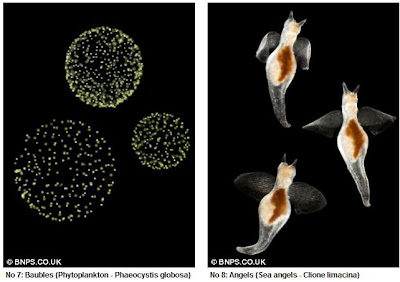By DAILY MAIL REPORTER
They would certainly make an interesting addition to any Christmas tree.
A top scientist who studies microscopic creatures that live in the sea has discovered the '12 plankton of Christmas'.
Dr Richard Kirby was struck by the number of the tiny life forms that had a festive appearance.
His photographs of the plankton are popular across the world and now he has picked his favourite festive dozen.
They include angels, bells, candles, baubles, snowflakes and one that looks like a Christmas tree.
The stunning photos taken through a microscope reveal a world that is unknown to most despite the importance of the micro marvels to the world's ecology.
His recently released coffee table book that includes dozens of pictures is already on its second print and is becoming a Christmas hit.

They are: a Christmas tree, five gold rings, Santa's hat, a candle, snowflakes, bells, baubles, angels, a Christmas lantern, a star, three wise men, and fireworks.
Dr Kirby is a Royal Society University Research Fellow and scientist at the University of Plymouth.
He said: 'I was looking through the photographs of plankton and some reminded me of Christmas.
'The variety is incredible and if you look at them with a festive eye you can see all sorts of things.
'Many people have remarked how certain plankton remind them of other things, so I've picked out the '12 plankton of Christmas'.
'The importance of these micro marvels in the sea can't be underestimated.
'Their importance on a global scale is obvious when you realize that 50 per cent of the world's photosynthesis takes place in the surface of the sea, drawing carbon dioxide from the atmosphere into the oceans and releasing oxygen.'

'The phytoplankton still found in the sea today were the first of the more complex life-forms to evolve on planet earth thousands of millions of years ago.
'Without the plankton food web there would be no fish in the sea or seabirds in the skies above. 'The largest mammals on earth, the baleen whales, even rely upon these smallest of sea creatures for their food.
'Most people are unaware of their presence, but if you have been swimming in the sea you will have almost certainly have swallowed them.
 No 11: Three wise men (Spider crab larva - Maja sqinado)
No 11: Three wise men (Spider crab larva - Maja sqinado)

No12: Fireworks (Protozoan Acantharea) round off the festive countdown
Plankton that give the sea its distinctive smell referred to as the 'sea air' because certain phytoplankton give off aromatic chemicals when they die.
They are even responsible for forming clouds because the same chemicals when in the atmosphere cause water droplets to form around them.
Dr Kirkby said: 'Striking features of our landscape such as the White Cliffs of Dover and the Seven Sisters of the South Downs are made of the remains of plankton cells called coccolithophores that sank to the seabed during the Cretaceous period of Earth's history between 145-65 million years ago.
'With sea temperatures rising as a result of a warming climate, the numbers and distribution of the plankton are changing with ramifications for the whole marine food chain, and the ecology of our planet.
'Your car is also fuelled by their remains and over millions of years they created some of the most enigmatic features of our coastline.
'When you turn on the oven to cook the Christmas turkey, the gas comes from plankton that sank to the seafloor over hundreds of millions of years of earth's history.
'So when you drive your car to the festive family gathering it is all thanks to the processed plankton that fuel it.'
The book, Ocean Drifters - a secret world beneath the waves - is published by Studio Cactus Ltd and priced at £14.99.
source: dailymail
Tuesday, December 7, 2010
The microscopic Advent Calender: Scientist discovers 'the 12 plankton of Christmas'
 10:14 PM
10:14 PM
 ms.tk
ms.tk










0 comments:
Post a Comment
Note: Only a member of this blog may post a comment.